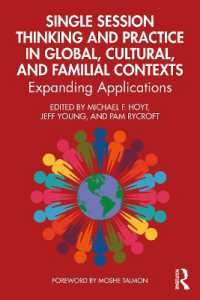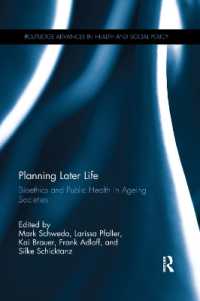Full Description
This comprehensive Research Handbook offers cutting-edge insights into classroom observation systems for teacher evaluation and professional development, with an emphasis on both applied and discovery-oriented inquiry.
Providing a synthesis of research on classroom observation, from the process-product era of the 1970s to today's automated systems, an international array of expert authors examine the history, key themes, and movements within classroom observation research. They detail disciplinary perspectives and approaches, address core methodological questions and review the role of classroom observation in teacher evaluation, as well as educational policy and practice. Chapters illustrate new frontiers in classroom observation, including technology-enabled methods such as the use of artificial intelligence to support dialogic teaching and provide performance feedback for teachers. The Research Handbook presents a pluralistic vision of classroom observation and its purpose, with balanced consideration of multiple value dimensions in education.
The Research Handbook on Classroom Observation is a vital reference for educational researchers and teacher educators, as well as teachers themselves. Education policymakers and consultants will also find this Handbook beneficial.
Contents
Contents
Preface xix
PART I GENRES, MOVEMENTS, AND FOUNDATIONAL INSIGHTS IN CLASSROOM OBSERVATION RESEARCH
1 Classroom observation research in the post-MET era 2
Sean Kelly
2 Applying process-product era principles for meaningful observation research in today's classrooms 20
Alyson L. Lavigne, Mark T. Lewis and Ryan E. Rarick
3 A systematic literature review of the empirical research on three of the most popular, U.S.-based, classroom observational systems 39
Audrey Amrein-Beardsley, Courtney Stone, Catherine M. Tremblay, Grace L. Beall, Surbhi Haridas Mendhe and Amanda Vecellio
4 Revisiting: "From Research to Practice: Recontextualizing the CLASS Program across Boundaries" 63
Samantha Caughlan, Mary M. Juzwik and Sean Kelly
5 Validating formative observation: teacher collaborative discourse as a vehicle to improve teaching 84
Bryant Jensen, Taylor Topham and Xiaohang Zhang
PART II DISCIPLINARY PERSPECTIVES AND APPROACHES
6 Using classroom observation to assess elementary teachers' discussion practices across content areas 110
Anne Garrison Wilhelm, Sam Prough, Rebecca Memmolo and Lynsey Gibbons
7 Making the case for classroom observational instruments that attend to equity 126
Jonee Wilson, Temple Walkowiak and Anne Garrison Wilhelm
8 Centering student participation in classroom observations 142
Noreen M. Webb, Megan L. Franke, Marsha Ing, Nicholas C. Johnson, Janene E. Ward and Adejah Taylor
9 A systematic review of classroom observation research on inquiry-based science instruction in South Africa 158
Umesh Ramnarain
PART III METHODS, MEASURES, AND STATISTICS
10 Mixing methods for analysing classroom dialogue: coding and beyond 174
Sara Hennessy, Edith Bouton and Christa Asterhan
11 Instructional improvement: leveraging computer-assisted textual analysis to generate insights from educational artifacts 190
Zewei (Victor) Tian, Min Sun, Alex Liu, Shawon Sarkar and Jing Liu
12 Observationally measuring teaching from the perspective of Behavioral Domain Theory and Generalizability Theory 208
Mark White and Armin Jentsch
13 How is teachers' mathematical knowledge visible during classroom observations? Unveiling the role of different conceptualizations of content and pedagogical content knowledge in teaching 224
Yasemin Copur-Gencturk and Ahreum Han
PART IV CLASSROOM OBSERVATION IN EDUCATIONAL POLICY AND PRACTICE
14 Considerations in using classroom observations to measure the effects of professional learning 245
Laura M. Desimone, Erica Litke and Julie Snipes
15 Considering the sources of racial disparities in observational evaluations of teachers 259
Matthew Truwit and Matthew Ronfeldt
16 Self-observation with video as a support for teacher noticing of student thinking 279
Jennifer Richards and Miriam Gamoran Sherin
17 Leveraging digital tools to expand teachers' access to literacy coaching: a review of the literature 294
Dana A. Robertson, Valerie Dunham and Christine M. Leighton
18 The benefits of peer teacher observations 310
E. Caroline Wylie, Christine J. Lyon and Eowyn P. O'Dwyer
PART V NEW FRONTIERS
19 Why instructional activities within classroom activity structures matter and how teacher dashboards can support advancements in instruction 327
Peter Youngs, Jonathan K. Foster, Patricia "Scout" Crimmins, Ginger S. Watson, Matthew Korban and Scott T. Acton
20 Automating feedback from recorded instructional observations: using AI to detect and support dialogic teaching 341
Jennifer Jacobs, Abhijit Suresh, Brandon M. Booth, Tamara Sumner, Jeffrey Bush, Chelsea Brown and Sidney K. D'Mello
21 Next generation classroom observations: leveraging AI to maximize the scalability and effectiveness of performance feedback for teachers 366
Alyssa Van Camp, Jessica Vitale and Blair Lloyd
Index 382








